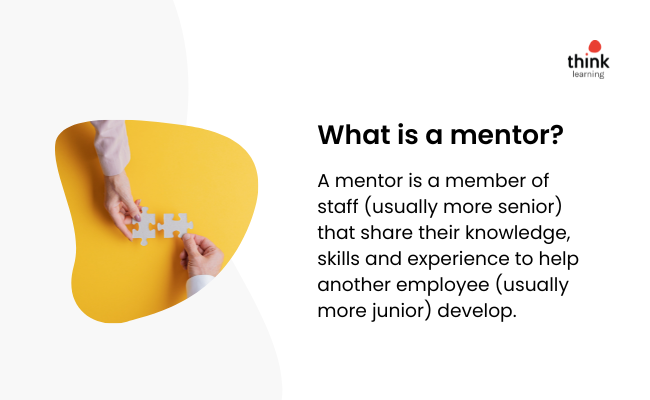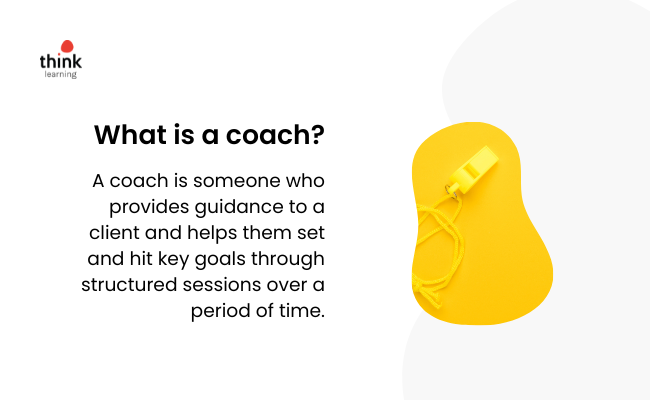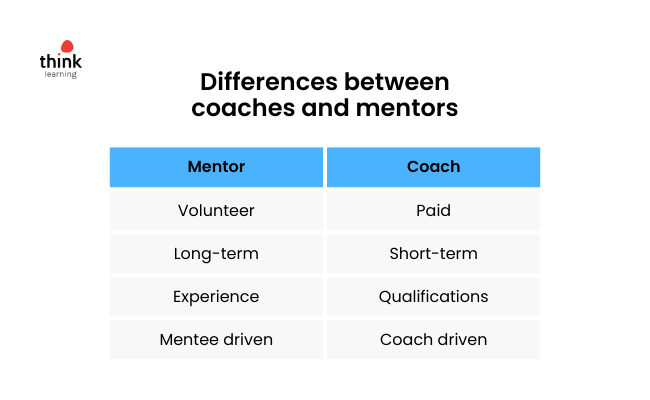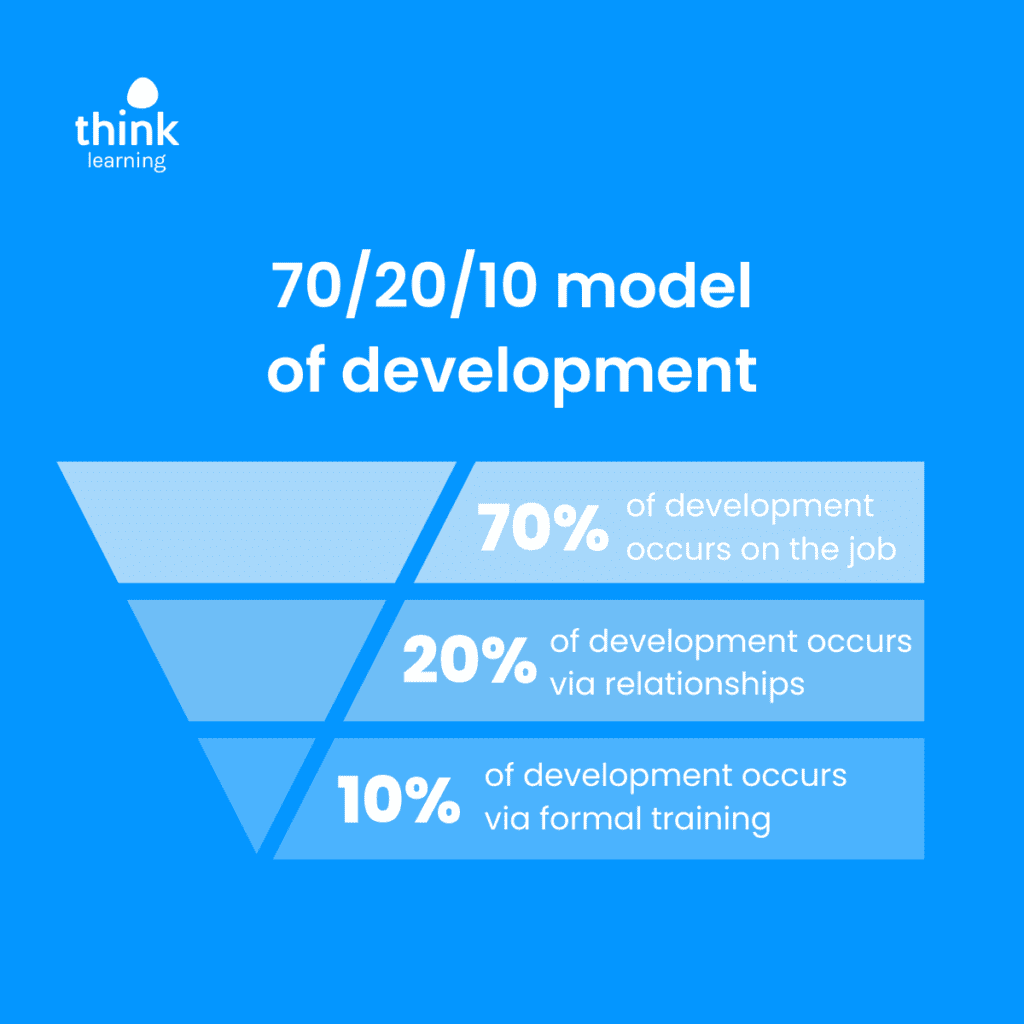
Coaching and mentoring exist for a similar purpose; to support people to develop. But what exactly is the difference between coaching and mentoring?
Are you struggling to understand the difference between coaching and mentoring? Both are great for people development, particularly if you have a team of talented employees who can guide your more junior staff. But, it’s essential to know when to use each one effectively.
We’re here to explain mentoring vs coaching so you can see if one is better or how both could work in tangent.
Keep reading to learn:
- What is the difference between coaching and mentoring is
- The benefits of coaching
- The benefits of mentoring
- Coaching vs mentoring: which is best?
- How to use coaching and mentoring in your workplace
Let’s get started.
💡 Pro Tip
At Think, we’ve created the perfect relationship-building tool that perfectly integrates into your LMS. You can better manage and report on coaching and mentoring relationships using ThinkLink.
Learn more about ThinkLink
What is the difference between coaching and mentoring?
Coaching and mentoring may seem similar, but they have distinct differences in their approach and purpose.
Coaching is often focused on specific goals and tasks, providing guidance and feedback to help individuals improve their performance.
On the other hand, mentoring is a more holistic and long-term relationship, where a mentor shares their knowledge, wisdom, and experience to guide the mentee’s personal and professional growth.
Understanding these differences is crucial in determining the right approach to support and develop individuals in various contexts.
Let’s break it down:
What is mentoring?
A mentor is a member of staff (usually more senior) that share their knowledge, skills and experience to help another employee (usually more junior) develop.
Related: Complete guide to mentoring in the workplace

What is coaching?
A coach is someone who provides guidance to a client and helps them set and hit key goals through structured sessions over a period of time.

Coaching vs mentoring: what is the difference between mentoring and coaching
Looking at the definitions above, you could be forgiven for thinking that coaching and mentoring are the same.
But, there are 5 key differences between mentors and coaches:
- Volunteer vs paid
- Long-term vs short-term
- Experience vs qualifications
- Personal experience vs general advice
- Mentee driven vs coach driven

Let’s look at these in more detail.
Voluntary vs paid
Typically, a coach is paid while a mentor is voluntary. A coach will also likely be an external influence while a mentor will usually be someone within your own company, or at least within your network.
There’s no benefit of one over the other, it just depends on what the person is trying to gain.
A coach will be better at fixing mindset issues, whereas a mentor will be better at giving specific lessons within their industry, job and company.
Long-term vs short-term
Generally, mentoring relationships last a lot longer than coaching ones.
Of course, the element of being paid usually has something to do with this. When you’re working with a voluntary mentor, especially one you work with who you likely share a lot of common ground, the relationship is going to be a lot different than the one produced in a coaching setting.
In some cases, mentoring relationships last a lifetime as mentors have a more vested interest in their mentee’s growth.
Experience vs qualifications
Being a mentor doesn’t require any specific training or qualification.
⚙️ Note
It is worth providing training or learning materials for your mentors so that they feel best prepared for their new role.
Meanwhile, a coach is usually trained and qualified in their position and has specific credentials to coach individuals.
A mentor will rely on their experiences both in life and their career to guide their mentee. It’s a much more personal approach which leads us nicely onto our next point.
Specific personal experience vs general advice
As expected, given the above, another key difference between a mentor and a coach is the type of advice they give.
A coach shares much more general advice that comes from their knowledge and training, as opposed to personal experience.
They’ll be focussed on developing set skills and identifying room for improvement. Meanwhile, a mentor will share much more personal experience and the mentee will use that to develop and learn from.
Given there’s more structure in a mentorship based on the mentee setting what they want to gain from it, the skills and experiences talked about will be much more specific.
Mentee driven vs coach driven
Typically, mentoring is less structured than coaching and it’s usually up to the mentee to lead and ask questions.
Coaching meanwhile generally has a more formalised structure and the coach will follow a set process at sessions.
Mentoring can be much more fluid which has its advantages.
Which is better, a coach or a mentor?
Honestly, it depends. Deciding whether a coach or mentor is best for your workplace programme really depends on what the participants, and your organisation, are hoping to gain from it.
Mentoring is generally more relaxed and looks at developing things like soft skills and confidence.
Meanwhile, coaching is a bit more targeted around performance.
What skills are required for mentoring and coaching?
If you’re considering setting up your own mentoring or coaching programme, you might be wondering what type of people you’re looking for to get involved.
Related: How to set up your own mentoring programme
Whether you’re looking internally or externally, there are some key skills you want to be on the lookout for.
Skills required for mentoring
To be a mentor, you don’t need any specific training or qualifications.
However, when you’re looking to build a mentorship, you will want to find mentors with certain skills:
- Wanting to give back and volunteer
- Strong communication skills
- Leadership skills
- Experience and knowledge that is relevant to potential mentees e.g. long-standing career, years working in a particular department etc
- Motivational and encouraging
Related: Best mentoring tools and resources
Skills required for coaching
You might look externally for a coach for your team, but it’s still important to be aware of the key skills needed to be an effective coach:
- Interpersonal skills
- Perceptive to spot strengths and areas of improvement for the coachee
- Organisation skills to build a plan to help improve the coachee based on their needs and requirements
- Strong communication skills
As you can see, there’s quite an overlap in skills required to be a coach and a mentor. Often, good coaches make good mentors and vice versa.
Key benefits of mentoring and coaching
Mentoring and coaching both have a huge role to play in the development of your people and your learning strategy.
When done well, they can benefit the individual receiving mentoring and coaching, along with the mentor or coach and the organisation too.
Benefits of mentoring
A lot of benefits are likely to come to mind when you think about mentoring.
When you think about the 70/20/10 learning model then it’s clear to see why mentoring is important.

Most of our knowledge comes from on-the-job training and our relationships with others.
Mentoring can hit both of these in one fell swoop.
Mentoring can also:
- Encourage employee engagement and improve productivity
- Increase employee retention rates
- Impact business results
- Easily be implemented and is low cost
- Improve soft skills and things like confidence and mental health
- Increase work networks
Benefits of coaching
Coaching is, as we know now, much more direct and targeted when it comes to objectives.
As such, its benefits are a little different from mentoring, but there are still overlaps.
Some benefits of coaching are that can:
- Offer specialised training and focus sessions
- Rapidly improve skills and knowledge
- Improve employee engagement and loyalty
- Increase employee retention
- Impact knowledge sharing
How to use coaching and mentoring in your organisation
As you can see, coaching and mentoring aren’t the same, but they both offer huge rewards when done well.
They’re two fantastic ways to develop individual team members and improve skills and knowledge.
Implementing a mentoring or coaching programme can help you identify rising stars, improve job performance, impact business results and so much more.
So how do you get started?
Well, first off you need to be clear that you’re set on developing people’s potential.
That’s the crux of it.
Next, you need to decide what the focus is. Coaching and mentoring each have their role to play.
If you’re looking to develop your people and foster better ties with your organisation, then mentoring is probably for you. If you’re looking to scale growth and skills of a select number of individuals to pivot your business, or drive growth, then coaching may be better suited.
You can get started by implementing a relationship management tool right into your LMS.
ThinkLink is a plugin we created to help L&D professionals better set up, manage and report on mentoring and coaching relationships.
See the tool in action and discuss your needs with one of our experts, by booking a demo here.

